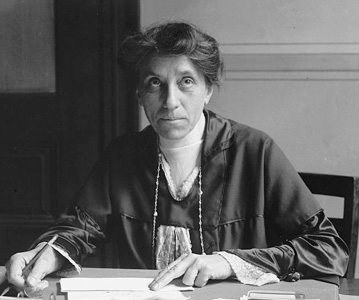
Born June 29, 1858, in Rockford, Illinois, Julia Lathrop’s father was a lawyer and personal friend of Abraham Lincoln. Her mother was a suffragist active in women’s rights activities.
Lathrop was able to attend and graduate from college. In 1890 she moved to Chicago where she joined Jane Addams and other women social reformers at Hull House, a settlement house aiding recently arrived immigrants. The women at Hull House actively campaigned to persuade Congress to pass legislation to protect children.
Lathrop was the first chief of the U.S. Children’s Bureau, the first woman ever to head a federal bureau. She modeled the Children’s Bureau investigations on the work she did while at Hull House.
The Children’s Bureau under Lathrop lobbied to abolish child labor. The Bureau’s use of scientific language battled contemporary ideas that high infant mortality rates were inevitable in working class and immigrant populations.
Lathrop argued that that high infant mortality among the poor and working class in American cities was not due to ignorance or laziness: “Which is the more safe and sane conclusion! That 88 per cent of all these fathers were incorrigibly indolent or below normal mentally, or that sound public economy demands an irreducible minimum living standard to be sustained by a minimum wage and other such expedients as may be developed in a determined effort to give every child a fair chance?”
In 1917 the American Association for Labor Legislation proposed a national health insurance act that included a provision for weekly cash allocations for pregnant women. Lathrop went against the private insurance industry and the American Medical Association to support this proposal. The American Medical Association called the law an “imported socialist scheme” and opponents accused Lathrop and other women who supported the act of being part of a sinister “spider’s web’ of Communist conspirators.”
It is important to note that in the South, much of the public health campaigns were undertaken by African-American, Latino or white clubwomen working in their own segregated communities.
Lathrop’s experience had given her firsthand knowledge of the conditions for children in county poorhouses and jails. Prior to the reform era, children over the age of seven were imprisoned with adults. Lathrop helped found the country’s first juvenile court in 1899 and the establishment of a juvenile detention home in Chicago.
After her retirement from the Children’s Bureau in 1922, Lathrop became president of the Illinois League of Women Voters. She also helped form the National Committee of Mental Illness, trying to dispel the myth of mental illness as a sign of moral defect. She died April 15, 1932.
Photo: Wikimedia Commons










